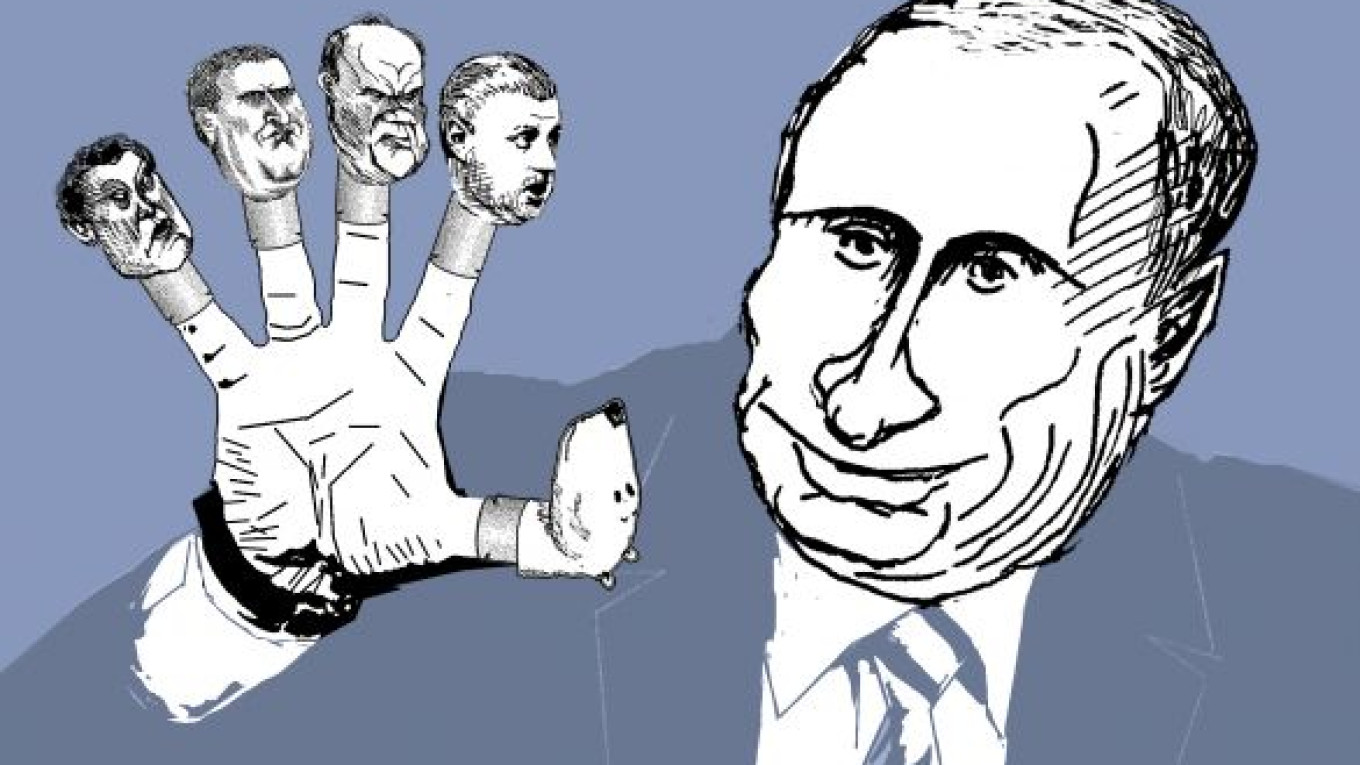The expulsion of Gennady Gudkov and his son Dmitry from the Just Russia party last week puts an end to any illusions that might still remain about the "systemic opposition" in the State Duma, which consists of the Communist Party, Just Russia and the Liberal Democratic Party. The situation wasn't entirely clear a year ago, when members of two of those parties took part in the mass protest rallies on Bolotnaya Ploshchad and Prospekt Akademika Sakharova last year. But that short-lived period of "systemic protest" ended abruptly earlier this year, when all three pro-?Kremlin Duma parties joined United Russia in a street rally to support the "Dima Yakovlev law" that banned U.S. adoptions of Russian orphans.? Their unanimous support last week to oust Dmitry Gudkov for speaking at a conference in the U.S. was the latest reminder of how subservient these "opposition parties" are to the Kremlin.
The December 2011 campaign to vote for any party but United Russia gave the Communist Party, Liberal Democratic Party and Just Russia millions of additional protest votes. Coupled with the mass protest rallies on the streets of Moscow, this created the illusion that the regime of President Vladimir Putin had become seriously weakened and might even be on the edge of collapse. The influence of the protest movement became so great at one point last year that presidential candidates Gennady Zyuganov of the Communist Party and Sergei Mironov of Just Russia even called for early Duma elections and radical political reforms in their campaign platforms. Now, one year later, not a trace remains of their former oppositional stance.
In Vladimir Lenin's 1920 treatise, "'Left-Wing Communism: An Infantile Disorder," he clearly formulated the concept of the authoritarian corporate state, firmly setting it as a priority for Russia's future. According to Lenin, the "dictatorship of the proletariat" and its patron, the Communist Party, was to rule the country and society with the help of trade unions, the media, workplaces and other party cells, all of which were to be created or strictly controlled by the state. Any person or organization that refused to play its designated subservient, loyal role as a cog in the larger party machine was subjected to harassment and punishment.
During Putin's 13 years in power, he has created an entire system of obedient cogs in the form of pro-Kremlin "opposition" parties, state-?controlled and censored media, pro-Kremlin nongovernmental organizations, the All-Russia People's Front and the so-called Open Government.
Outwardly, the systemic parties look very different from each other, like cogs of differing colors: the Communist Party is red, the Liberal Democratic Party is yellow and Just Russia is orange. But they all work together to put the same Kremlin political machine into motion. When necessary, they all sing the same tune, whether the lyrics happen to be anti-U.S., anti-liberal, anti-gay or anti-?Georgian, whatever the Kremlin commands.
Meanwhile, genuine, Kremlin- independent opposition parties have been sidelined. They have become victims of an organized campaign by the authorities to discredit its members and place under house arrest or jail its leaders on trumped-up charges.
After his return to the Kremlin on May 7, Putin has been tightening the screws on his vertical-power structure. He skillfully introduced a system of reward and punishment to keep the government cogs more closely attuned and proactive in cracking down on the protest movement. The four Duma parties all received a 250 percent increase in funding from the federal budget. Liberal Democratic Party member Alexei Ostrovsky became governor of the Smolensk region, Just Russia member Konstantin Ilkovsky was made acting governor of the Zabaikalsky region, and the Communists have reportedly been promised continued control over the Vladimir region, currently headed by Governor Nikolai Vinogradov.
The Kremlin has been able to maintain strict control over the members of the three systemic opposition parties in the Duma through its powerful administrative resources that include the freedom to sell seats in electoral lists and access to Kremlin-controlled television for those who support and defend the Kremlin. At the same time, if they ever get out of line they face the threat of expulsion, a smear campaign or criminal charges.
In the end, the Kremlin has effectively made fools out of millions of angry voters who cast their ballots for "any party but United Russia" in the December 2011 Duma elections. It turns out that they voted for different-colored cogs of the same political machine, a system that controls all the power and property in Russia and is run but a single man sitting in the driver's seat.
Vladimir Ryzhkov, a State Duma deputy from 1993 to 2007, hosts a political talk show on Ekho Moskvy radio and is a co-founder of the opposition RP-Party of People's Freedom.
A Message from The Moscow Times:
Dear readers,
We are facing unprecedented challenges. Russia's Prosecutor General's Office has designated The Moscow Times as an "undesirable" organization, criminalizing our work and putting our staff at risk of prosecution. This follows our earlier unjust labeling as a "foreign agent."
These actions are direct attempts to silence independent journalism in Russia. The authorities claim our work "discredits the decisions of the Russian leadership." We see things differently: we strive to provide accurate, unbiased reporting on Russia.
We, the journalists of The Moscow Times, refuse to be silenced. But to continue our work, we need your help.
Your support, no matter how small, makes a world of difference. If you can, please support us monthly starting from just $2. It's quick to set up, and every contribution makes a significant impact.
By supporting The Moscow Times, you're defending open, independent journalism in the face of repression. Thank you for standing with us.
Remind me later.


